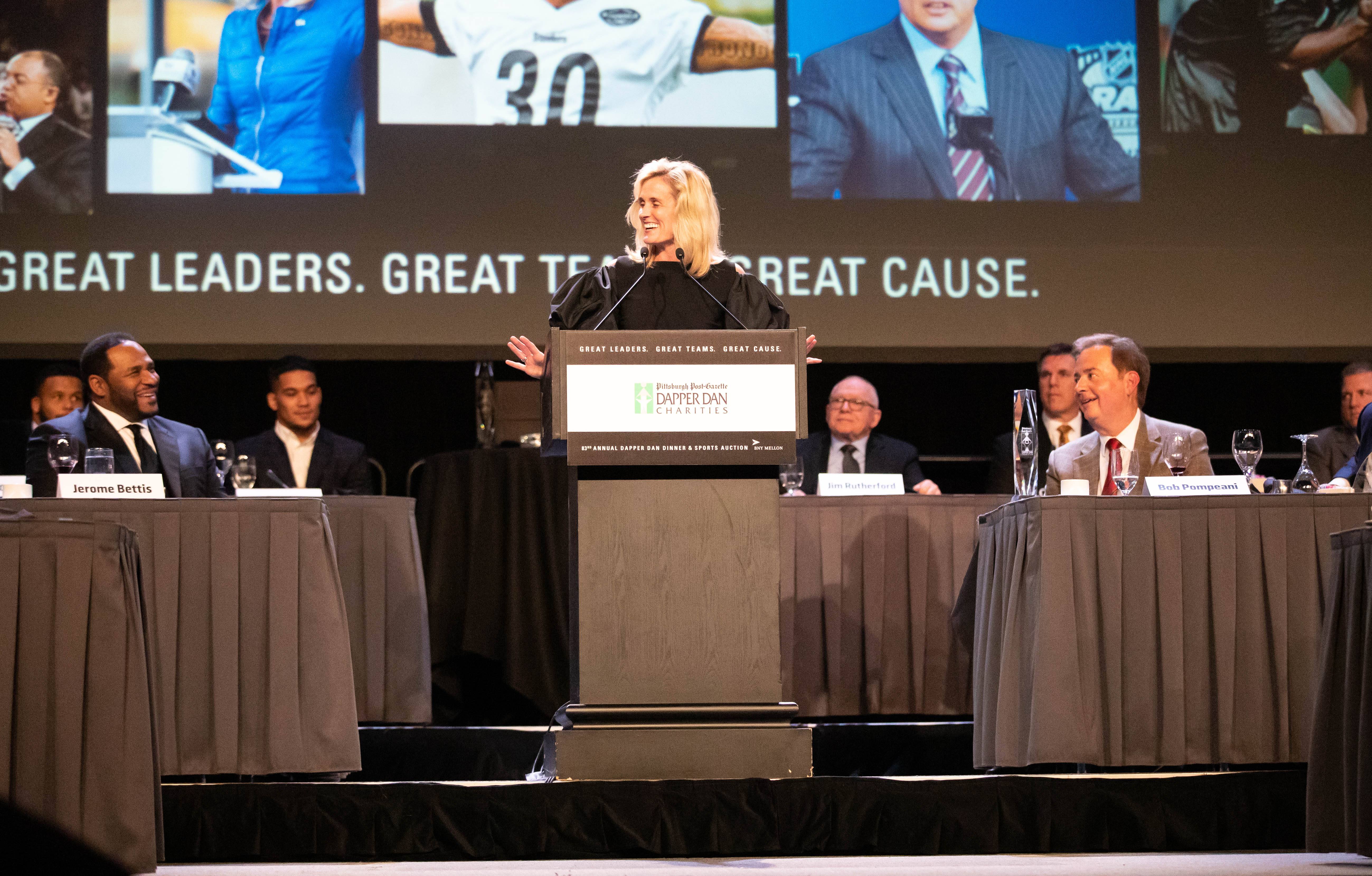
By SUSAN JONES
It seems Pittsburgh and Pitt have taken a liking to Heather Lyke.
The Pitt athletic director received the Dapper Dan Sportswoman of the Year award on Feb. 20, the 20th woman to win the award and one of the few without longtime ties to Western Pennsylvania.
DAPPER DAN AWARDS
This year’s Dapper Dan Awards were heavy on Panther Pride. In addition to Lyke, former Pitt running back and current Steelers starter James Conner was honored as Sportsman of the Year.
The first Dapper Dan Award, founded by the Post-Gazette, was handed out in 1989.
Other Pitt-related people to win the award include:
1952: Red Dawson, football coach
1973: Johnny Majors, football coach
1976: Tony Dorsett, running back
1980: Hugh Green, quarterback
1981: Jackie Sherrill, football coach
1983: Dan Marino, quarterback
1989: Roger Kingdom, sprint hurdler
2002: Ben Howland, basketball coach
2003: Larry Fitzgerald, wide receiver
2005 and 2007: Agnus Berenato, women’s basketball coach
2008: Shavonte Zellous, women’s basketball
2010: Jamie Dixon, basketball coach
Suzie McConnell-Serio was honored in 1999, before her stint as Pitt’s women’s basketball coach.
The University of Michigan graduate came to Pitt two years ago after stints at Eastern Michigan University, the University of Cincinnati and Ohio State. Since then, she’s hired seven new coaches and renewed the contract of football coach Pat Narduzzi through 2024. Last year, Lyke was signed to a new six-year contract through at least 2024, and for now she plans on staying.
“My hope is not to move around the country. That’s not my goal,” Lyke said. “My goal is to really make this place provide our coaches and student-athletes with the greatest opportunity to have success here and really make coming to Pitt an extraordinary experience for our student-athletes.”
To do that, Lyke said, she’s had to work on changing the mentality here and building a good administrative and coaching team.
She lists her biggest accomplishments as, “building the team of athletic department staff and head coaches who are going to directly impact our student-athletes’ experiences. I mean, it is true, you win with people, so it starts there. And then trying to establish a culture of a winning attitude and a belief that we can go compete for ACC championships.”
This new attitude hasn’t gone unnoticed.
“I think in the past, the attitude was we’re interested in winning, but status quo was acceptable,” said Jay Irrgang, head of the University Senate’s Athletics and Recreation committee and chair of the School of Health and Rehabilitation Sciences physical therapy department. “And under Heather, status quo is no longer acceptable. I think she’s made it clear that the number one priority is the total student-athlete experience that includes all aspects, including winning championships. Finishing about 500 is not good enough. The goal should be winning conference championships and going on to NCAA competition.”
In announcing the new contract last year just 13 months into Lyke’s tenure, Chancellor Patrick Gallagher said: “Heather is leading an ambitious charge to transform Pitt Athletics, and her success here is just beginning. I am thrilled that she will continue to push our athletics programs to new heights — and spur positive change for our student-athletes and our university community — for years to come.”
Lyke is happy with the team she’s assembled, including new coaches for men’s and women’s basketball, gymnastics, women’s soccer, wrestling, diving and softball.
“I can’t think of one of the coaches that we hired or that is here that I wouldn’t want my son or daughter to play for,” she said.
Even though the men’s and women’s basketball teams have struggled some this year, Lyke is confident fans will be patient as the new coaches build their teams.
“I think we have two extraordinary leaders on both sides on the men’s and the women’s program,” she said. “I think people understand the kind of the programs that they inherited, and, more importantly, I think that there is progress with the teams that they have. You can see the improvements.
“Maybe on the men’s side, we’ve got freshmen who we’re depending on in many ways, but there’s no question that the unit, the team itself, has rallied, playing incredibly hard for this coaching staff.”
The final factor is recruiting the right players, she said. “So that’s really the most important thing that they spend a lot of time on outside of the game itself.”
Pitt recently received commitments from 6-foot-6 forward Gerald Drumgoole and Karim Coulibaly, a 6-foot-8 forward.
Victory Heights
Part of improving the morale is “looking where our student-athletes and coaches live and learn every day,” Lyke said. “Our athletic facilities are their learning environments.”
Right now, 16 of Pitt’s 19 teams work out in Fitzgerald Field House, a 1951 facility with no air conditioning. And Lyke says the new Victory Heights complex proposed in the Campus Master Plan is a chance to “start over.” That includes a progressive new arena, an athletic performance center and places where students can train, do strength conditioning, and learn about proper nutrition and sports medicine.
FLIPPING THE PETE
After the end of basketball season, the athletic department plans to flip the court in the Petersen Events Center, Lyke said. This will put the team benches in front of the Oakland Zoo, giving more TV visibility to Pitt’s most ardent fans. The courtside seats will be on the other side.
It also will mean re-sanding and re-painting the court with the Pitt script facing the other direction.
The plan is to re-seat the arena, during which people will be given the opportunity to decide, based on priority and years of giving, where they want to be seated.
And what about those color? Lyke says to stay tuned for an announcement in the spring. It has been widely rumored that Pitt’s teams would be going back to the royal blue and yellow colors that were used from 1973 to ‘97.
“We need to get competitive from a facility standpoint,” she said.
The first step in the facilities improvement plan is to add a third floor to the Petersen Sports Complex at the top of “cardiac hill.” Lyke said the addition is being designed this year and will be built next year. It will house the coaches for baseball, softball, men’s and women’s soccer, and women’s lacrosse, which is replacing tennis next year.
Getting those coaches out of the field house is “the first domino that needs to happen.”
Eventually the field house will be torn down and a human performance center is planned at the Petersen Sports Complex, along with a 300-meter indoor track and 400-meter outdoor track.
The Campus Master Plan also includes renovations and an expansion of Petersen Events Center, but not until the second or third phase. The plan would move the Baierl Student Recreation Center out of Petersen to a new rec center on O’Hara Street and then utilize that space for athletic training areas and office space. An new space could include an expanded weight training, cardio and hydrotherapy facility for student-athletes.
While there’s no specific timeline for Victory Heights, Lyke said, “we’re aggressively working toward these goals. And we’re doing it in collaboration with the University and our board of trustees who have been incredibly supportive.”
Lyke has been very involved in the facilities planning.
“There was a new space plan that was developed under the prior AD. She quickly reviewed that and realized that they probably could do better with the space plan,” Irrgang said. “She put together a really aggressive master facility plan that, if it gets implemented, will put Pitt at the top of the ACC.”
The student in ‘student-athlete’
Irrgang said Lyke has been very vocal about making the entire student-athlete experience a positive one. And she wants the programs that are developed for the student-athletes to also benefit the rest of the University.
“She sat in on some discussions that we had relative to the goals and objectives of the Senate Athletic Committee, and because of her comments, the focus of the athletic committee was revised. It’s now the Senate Athletic and Recreation Committee … implying that the committee also address the concerns of students, faculty and staff as it relates to health, recreation and intramural sports.
“Her focus is really enhancing the University overall through athletics,” he said. “And she does demand academic excellence as well; that definitely needs to be said.”
Lyke said she thinks the best way the athletic department interacts with the rest of the University “is through the relationships we build across campus, and then the intentional collaborations and opportunities to partner with one another.”

Some of those partnerships include:
-
A new physical therapist who came directly out of Pitt’s physical therapy program. “We have the number one physical therapy program in the country, you would think that there would be somebody who want to work directly with athletics in that program.”
-
The new Pitt Studios, which has created several avenues to collaborate. A new film and media studies major was created, and the faculty position was a joint hire — Kevin Smith is part-time faculty and part-time Athletic Department employee. Students will get to use the studio for class and practicum hours. They also plan to employ 15 to 20 students each semester to help with ACC and ESPN broadcasts. Students also have a chance to get connected to the NEP Group, who sponsored the studios, for internships.
-
Several opportunities to build relationships with the Health Sciences schools. “In the Victory Heights vision, we have an athletic performance center, and I think there can be some really unique research components that we could tap into, as far as studying human performance and how do you maximize human performance and potential,” Lyke said.
-
Leading the way on the online mentoring program Pitt Commons. Athletics was one of the trial locations for the program that matches up students with mentors both inside and outside of the Pitt campus. Lyke herself has two mentees who she talks to regularly.
Building donor relations
The next step to build up Pitt’s athletic department is to look at fundraising, according to Lyke.
“I think her challenge is that she needs to turn her attention to fundraising. To support everything she’s doing is going to take a lot of money,” Irrgang said.
“Her next big challenge is to get the support of our alumni and fans to step up to the plate and provide the gifts and the funding that’s necessary to realize the plan — that goes from scholarships to all the things that are in the master facilities plan.”
Pitt’s fundraising for athletics has traditionally not matched up to other schools in the ACC. And in order to grow that, Lyke said, she has to start with the infrastructure. Just like hiring new coaches, she has had to hire new people in the development office, including Chris McFarlane, who was brought onboard in August as executive associate athletic director for philanthropy and engagement after five years at Northwestern University.
“We have the second largest enrollment in the ACC, and we have the second largest living alumni, and they’re relatively close in proximity,” Lyke said. “Our focus is about building relationships and trying to make connections and getting introduced to people and people introducing us to people.
“So we have to build out our staff and we have to have quantifiable goals and objectives for that staff — X number of visits a month, X number of opportunities to go meet people. Really trying to bring people in and help them understand what we’re all about and why we want them to be a part of the future.”
Susan Jones is editor of the University Times. Reach her at suejones@pitt.edu or 724-648-4294.
